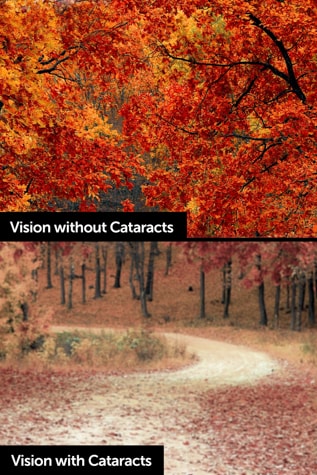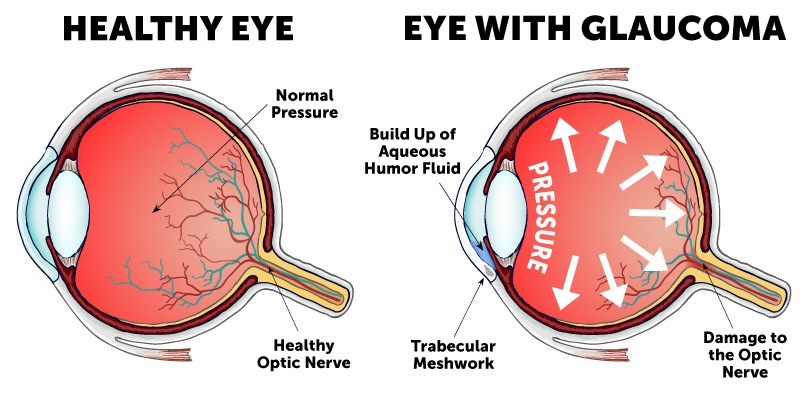
September 15, 2020
Keeping an Eye on Aging
Aging is a normal, natural part of life. Prioritizing your health as you age becomes increasingly important to ensure a high quality of life and to reduce the risk of age-related medical issues. September is Healthy Aging Month - a month dedicated to raising awareness around health and aging. Today we’re talking particularly about how your eyes and vision are subject to the natural aging process. Eye health is good for everyone to keep their eyes on!
As we age, our eyes age. Most notably, beginning between the ages of 40 and 50, seeing at close distances and reading becomes increasingly difficult. The lens within the eye becomes hardened and loses its flexibility. This is known as presbyopia and is typically corrected through reading glasses prescribed by your primary eye doctor and can later be considered for correction with a premium cataract lens during cataract surgery. Learn more about premium lenses here!
Aging is also notorious for causing a variety of other medical eye conditions including cataracts, age-related macular degeneration and glaucoma. While the effects to the eyes within the aging process cannot be prevented, visiting your eye doctor regularly is the best way to detect eye disease early on. If needed, your eye doctor will refer you to Wolfe Eye Clinic and work closely with an ophthalmologist that is trained in eye disease and surgery. The eye specialists at Wolfe Eye Clinic have been providing specialized medical and surgical eye care and treatment in Iowa for more than 100 years.
What are cataract symptoms?
 Cataracts can begin to develop as early as the age of forty and are quite common. Over fifty percent of Americans over the age of 80 have cataracts or have had cataract surgery, according to the National Eye Institute. Cataracts form as proteins clump together and begin to cloud your eye’s naturally clear lens. Your lens helps you see clearly and focus on objects at all distances. As the lens becomes increasingly cloudy, vision becomes blurry and foggy at near and far distances. Other symptoms include:
Cataracts can begin to develop as early as the age of forty and are quite common. Over fifty percent of Americans over the age of 80 have cataracts or have had cataract surgery, according to the National Eye Institute. Cataracts form as proteins clump together and begin to cloud your eye’s naturally clear lens. Your lens helps you see clearly and focus on objects at all distances. As the lens becomes increasingly cloudy, vision becomes blurry and foggy at near and far distances. Other symptoms include:
- Seeing dull, faded or brownish colors
- Difficulty seeing and driving at night
- Halos around lights
Cataracts can only be removed through cataract surgery and they do not heal over time. The cataract specialists at Wolfe Eye Clinic have been leaders in cataract surgery in Iowa for more than 100 years, with the most advanced procedures and technology. They provide cataract evaluation and treatment throughout the state of Iowa with locations in Ames, Cedar Falls, Hiawatha (Cedar Rapids), Des Moines, Fort Dodge, Iowa City, Marshalltown, Ottumwa, Pleasant Hill, Spencer and Waterloo.
What is age-related macular degeneration?
Age-related macular degeneration or AMD is a leading cause of vision loss in Americans over the age of 60. Associated with aging, AMD gradually affects the central area of the retina called the macula, responsible for sharp, central vision. Central vision is essential for everyday tasks like reading, recognizing faces and driving. Without proper care and treatment, the ability to see fine detail diminishes and blank spots can appear at the center of vision. While there is no cure for AMD, there are effective AMD treatments from supplements to intravitreal injections of medicine into the eye. The best treatment depends on which type of AMD you have and its severity.
There are two types of AMD: Wet AMD and dry AMD. All AMD starts as dry AMD and both forms impact the macula and central vision. Dry AMD occurs when the light-sensitive cells in the macula break down. Wet AMD is the growth of abnormal blood vessels under the macula, often leaking blood and fluid and causing scarring and permanent damage. While dry AMD is much more common, wet AMD accounts for the majority of severe vision loss. If you develop wet AMD, treatment from a retina specialist is essential in preventing you from permanently losing vision.
The macular degeneration specialists at Wolfe Eye Clinic are fellowship-trained experts in diagnosing and treating AMD, offering care across Iowa in Ames, Cedar Falls, Hiawatha (Cedar Rapids), Des Moines, Fort Dodge, Iowa City, Marshalltown, Ottumwa, Pleasant Hill, Spencer and Waterloo.
Am I at risk for glaucoma?
Glaucoma is an eye disease that gradually damages your eye’s optic nerve. The optic nerve is located at the back of your eye and sends visual information from your eye to your brain via electrical impulses. Usually, damage to the optic nerve is due to the buildup of fluid in the eye, increasing the eye’s overall pressure, known as intraocular pressure.

According to the American Academy of Ophthalmology, for people over the age of 60 years old, glaucoma is a leading cause of irreversible blindness. While individuals over the age of 40 are at a higher risk, African Americans are at higher-than-average risk and can suffer greater loss of vision and earlier onset than other patients do. Glaucoma also tends to run in families and patients with diabetes, who are taking steroids, or who have suffered eye trauma are at an elevated risk.
There are different types of glaucoma including open-angle glaucoma, closed-angle glaucoma, normal tension glaucoma and secondary glaucoma. Glaucoma symptoms depend on the type of glaucoma you have but generally, patients can experience:
- Blurred vision
- Patchy blind spots in your peripheral vision
- Severe headache
- Eye pain
- Halos around lights
The best glaucoma treatment depends on the type of glaucoma you have as well as its severity. Treatment of glaucoma can range from glaucoma eye drops to glaucoma surgery. Wolfe Eye Clinic glaucoma doctors are experts in evaluating and treating all types of glaucoma in Iowa with locations in Ames, Cedar Falls, Hiawatha (Cedar Rapids), Des Moines, Fort Dodge, Iowa City, Marshalltown, Ottumwa, Pleasant Hill, Spencer and Waterloo.
Iowa Eye Exams
According to the American Academy of Optometry, patients age 18-64 should have their eyes checked at least every two years to maintain healthy vision. Those with additional risk factors such as a family history of glaucoma or individuals 65 and older, should visit their eye doctor at least annually. If you’ve noticed a change in your vision, it is important to reach out to your eye doctor for an appointment.
Should an eye disease be discovered while visiting your eye doctor, your optometrist can easily set up an appointment for you with a Wolfe Eye Clinic specialist on your behalf. You can also reach Iowa’s eye specialists at Wolfe Eye Clinic by calling (833) 474-5850 or request an appointment online, here. It’s that easy!